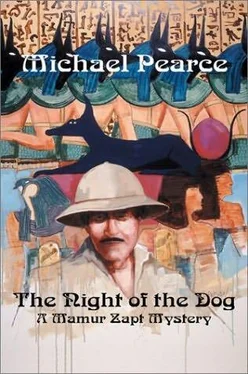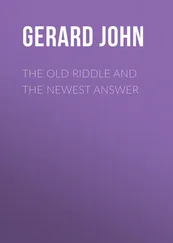Michael Pearce - The Mamur Zapt and the Night of the Dog
Здесь есть возможность читать онлайн «Michael Pearce - The Mamur Zapt and the Night of the Dog» — ознакомительный отрывок электронной книги совершенно бесплатно, а после прочтения отрывка купить полную версию. В некоторых случаях можно слушать аудио, скачать через торрент в формате fb2 и присутствует краткое содержание. Жанр: Исторический детектив, на английском языке. Описание произведения, (предисловие) а так же отзывы посетителей доступны на портале библиотеки ЛибКат.
- Название:The Mamur Zapt and the Night of the Dog
- Автор:
- Жанр:
- Год:неизвестен
- ISBN:нет данных
- Рейтинг книги:3 / 5. Голосов: 1
-
Избранное:Добавить в избранное
- Отзывы:
-
Ваша оценка:
- 60
- 1
- 2
- 3
- 4
- 5
The Mamur Zapt and the Night of the Dog: краткое содержание, описание и аннотация
Предлагаем к чтению аннотацию, описание, краткое содержание или предисловие (зависит от того, что написал сам автор книги «The Mamur Zapt and the Night of the Dog»). Если вы не нашли необходимую информацию о книге — напишите в комментариях, мы постараемся отыскать её.
The Mamur Zapt and the Night of the Dog — читать онлайн ознакомительный отрывок
Ниже представлен текст книги, разбитый по страницам. Система сохранения места последней прочитанной страницы, позволяет с удобством читать онлайн бесплатно книгу «The Mamur Zapt and the Night of the Dog», без необходимости каждый раз заново искать на чём Вы остановились. Поставьте закладку, и сможете в любой момент перейти на страницу, на которой закончили чтение.
Интервал:
Закладка:
“Where the woman was waiting?”
“Yes. It seemed like that, because as soon as he got to her she turned and left with him. I was aware of it because she had been partly blocking my vision and when she left I could see the little boys bringing fire.”
Deep in the recess of the hotel a gong sounded and Miss Postlethwaite stirred slightly. A splendid suffragi in a red sash appeared at the door. Mahmoud rose to his feet and put out his hand.
“Thank you very much, Miss Postlethwaite,” he said. “You have been an immense help.”
“I have? Oh, I am so pleased.”
“You are an excellent observer.”
“I just notice what I see.”
“Not everyone does.”
Mahmoud could not forbear a glance in Owen’s direction. “Oh, of course,” said Jane Postlethwaite, catching the glance and misinterpreting it. “You will already know all this. Captain Owen will have told you.”
“Not quite all, Miss Postlethwaite,” said Mahmoud, “not quite all.”
CHAPTER 4
It was safe to assume in Cairo that nothing you did would go unobserved. No matter how private the occasion or how secret the place, someone would be bound to be watching. So it was with the matter of the dog. It was not long before Georgiades, Owen’s agent, had found not one but two witnesses. Not only that; the accounts of the witnesses-and this was definitely unusual in Cairo-roughly corresponded.
The first was an old man, an Arab, who lived in the cemetery. Georgiades showed Owen where he lived. It was in a space between two gravestones beneath the rubble of a collapsed tomb. Peering down between the stones Owen saw a hole about five feet deep and four feet square. It was in there that the old man lived. Apart from a worn rush mat he had no provisions, but the hole at least kept him cool during the hot weather and sheltered him from the wind during the khamsin. He had a short, torn galabeah and thin, bird-like legs. His face was scruffy with grey stubble and his eyes, as they looked up towards the light, were so red with disease that the first question was whether he could have seen what he claimed he had.
During the night, he said, men had come.
Men? Yes, he was adamant. Four or five of them, carrying something. They had stopped some way from the tomb. He could show them. No, he had not gone himself to the place, he had been frightened, thinking that perhaps they were carrying a corpse. The Copts would have been angry with him if they had seen him. They would think he had been observing their secret rites. So he had kept well away from them, hidden among the rubble, but he had definitely seen them, a small group of men in the light of the moon.
Had they gone to the tomb? Did he know which tomb? Yes, he did. It was the tomb of Andrus. He knew Andrus because the Copt had often chided him when he saw him among the tombs; but he had sometimes given him alms, too. He knew the tomb because he had sometimes seen Andrus there, praying. It was a holy place and he, the old man, often liked to sit there, especially when the sun had just moved off the wall, because then he could sit there with his back against the wall and the stone would warm his back. He knew the tomb and he had seen the men going there.
Did they go in? Yes, but not for long. It was a holy place and perhaps they had been frightened. He had heard the door squeak and then they had all come running down the stairs and made off into the rubble.
He had seen the men in the moonlight: what sort of men were they? Bad men. Only bad men would do a thing like that. To come at night to the Place of the Dead! And there to do mischief. Bad men. Bad men.
But what sort of men were they? Were they-and this was the tricky question-were they Copts? Or Moslems? The old man was silent. Owen tried again. How were they dressed? In galabeahs or in trousers? Alas, the old man could not see. He had been far away and it had been dark. Yet he had seen the men in the light of the moon. The old man became confused and fell silent.
Owen tried a different tack. Did they come as men who knew the necropolis, or did they hesitate, wondering which way to go? The old man thought they knew. But then he thought that they had stopped before going to the tomb because perhaps they had not been quite sure which one it was.
His attention began to wander and it soon became apparent that there was no point in questioning him further.
The second witness was a small boy. There were lots of small boys in the necropolis. Not all of them were abandoned orphans. Some of them had loose connections with families in the poor districts which surrounded the cemetery. The families were often unable to sustain too many children and the older ones sometimes drifted away into a kind of semi-independence.
The girls became household servants or prostitutes. The boys made for the wilderness of the necropolis. Like the old man, they sustained themselves by begging from the wealthy Copts and fighting for scraps of food among the garbage tossed out into the cemetery from the more well-to-do Moslem houses along its western side. They moved in gangs, like the packs of dogs of which there were plenty in the necropolis, and with which they had a curious relationship, half-inimical, half-tolerated, sharing a mutual signalling system which alerted them at once to any intruders.
Aware of newcomers though they might be, that did not make them more ready to come forward. Even though they had already made Georgiades’s acquaintance, when he appeared with Owen they remained hidden among the stones, and he had to have recourse to the strategy which had worked before. He settled himself comfortably on the edge of a tomb and began to toss a coin casually into the air.
He went on tossing for about ten minutes, and only then did the first heads begin to appear. Slowly they moved forward until there was a ring of little boys surrounding them, all keeping at safe fleeing distance. At last Georgiades’s contact came out of hiding. Once he had made his move he came boldly forward, but stopped just beyond arm’s length.
“Who is this man?” he said, pointing at Owen.
“He’s a friend of mine,” said Georgiades.
“I know him,” said the boy. “He’s the Mamur Zapt.”
“Like I said. He’s a friend of mine.”
“You have powerful friends.”
“I need them.”
The boy looked doubtful.
“It is dangerous to have powerful friends,” he said.
“Worse to have powerful enemies.”
“He couldn’t touch me.”
“I wouldn’t want to touch you,” said Owen.
The boy seemed more than half-inclined to retreat back among the stones. Georgiades began to toss his coin speculatively.
“Does he pay you?” said the boy suddenly.
“Not enough,” said Georgiades.
That seemed to reassure the child.
“One never gets enough,” he said, with the air of an old man.
“One has to live by one’s wits.”
“Will he pay me, too?”
“I will pay you,” said Owen, “if you tell me what I want to know.”
The boy still did not come forward.
“I am afraid,” he said.
“I shall not hurt you,” said Owen.
“It’s not you I’m afraid of.”
“Who are you afraid of?”
“The big man with his knife. Also the holy one.”
“Which one are you afraid of most?” asked Georgiades.
The boy considered.
“The holy one,” he said at last. “The other, though big, is slow. He would never catch me. The holy one has many men. He might get one I did not know to seize me and hold me so that he could beat me. Also,” he added as an afterthought, “the holy one might call down great curses on me.”
“If you tell me the truth,” said Owen, “I will give you something which will heal both the beatings and the curses.”
Читать дальшеИнтервал:
Закладка:
Похожие книги на «The Mamur Zapt and the Night of the Dog»
Представляем Вашему вниманию похожие книги на «The Mamur Zapt and the Night of the Dog» списком для выбора. Мы отобрали схожую по названию и смыслу литературу в надежде предоставить читателям больше вариантов отыскать новые, интересные, ещё непрочитанные произведения.
Обсуждение, отзывы о книге «The Mamur Zapt and the Night of the Dog» и просто собственные мнения читателей. Оставьте ваши комментарии, напишите, что Вы думаете о произведении, его смысле или главных героях. Укажите что конкретно понравилось, а что нет, и почему Вы так считаете.












